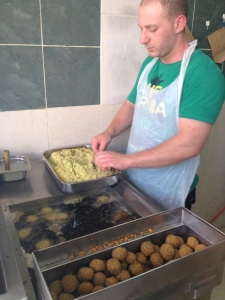For this first time since seeing the original three Star Wars movies, I went into seeing Rogue One without any spoilers or knowledge (besides what was in the trailers and the premise that it occurs during the time right before the third episode).
With that being said, there are SPOILERS ahead.
One thing is clear about Rogue One: it is a war movie. I watched it on December 15th, after spending several days reading and watching the horrors that were unfolding in Aleppo. As Jyn Erso and Cassian Andor dove in and out of the desert roadways destroyed and blown up by imperial forces in a city on the moon Jedha, all I could see were the images of Aleppo’s destruction superimposed over them. The scene where Jyn dives through a fire fight to rescue a small girl screaming and crying only reflects in a small part the terror that orphans in Aleppo have experienced, with bombs going off all around them night and day, before finally being forced to abandon their home.
I almost walked out at that part, as those scenes, the wide pan shots stolen from Syria’s border-country Jordan in Wadi Rum, reminding me of my own time there in Wadi Rum and in the northern part of Jordan, peering over the Golan Heights to Syria, which, in 2014, was actually in better shape than it is now. I looked around, expecting to see other people bawling their eyes out, or eyes drawn in horrified recognition of the parallels this movie was drawing, but I saw nothing.
The reason why Rogue One is such a deviation from what Hollywood typically has to offer is it tells a story that rarely gets told. It tells a story that ends in death, and for the main characters, despair. Their only comfort comes in the knowledge that they had given their all for a chance, a sliver of a chance that their actions would lead to a slip in the Empire’s grip and that their rule would be abolished. Despair is quite a common theme in Hollywood, yes, but the overarching believe in the cause that Jyn and Cassian (and the rest of the cast) lived and died for give their deaths a significance and meaning for the audience, even if it doesn’t for the characters themselves.
They lived their lives in faith, acting upon a belief in their flawed cause, but [just like the matriarchs and patriarchs the author of Hebrews discusses in chapter 11] they died before seeing the fruits of their faith and action.
Rogue One is a good reminder to all that doing good when nobody sees it is not a waste; and to Christ-followers, it is an encouraging reminder that no good deed will go unpunished in this life, have an eternal reward for our actions that cannot be seen this side of heaven.
It tells a story of why, even when there is no benefit to us personally, and indeed great harm, we should persist in doing good even when we will not be praised, we will not be sung about or talked about in blogs or TV shows or books. Instead of pursuing the humanistic philosophy that “you should do what feels right,” it pursues a harder line of inquiry: “You should do what is right regardless of how it makes you feel.”
Rogue One was also a reminder that no matter how epic the space battles look, no matter how sweeping the vista or impressive the special effects, people are dying. People who may make a wrong choice on the “right” side of the war, or a right choice on the “wrong” side of the war.
Jyn Erso’s father, Galen, spends years laboring for the Empire simply because he knows that he is at the right place at the right time, and has a slim [but better than anyone else’s] chance of saving lives. But he gives up his life in the process, both the quality of his life and the existence of it. Despite his absence from Jyn’s life, and her consequential resentment of him, he is willing to make that sacrifice and accept the consequences of his choices– choices that to Jyn seem hard and unfeeling, but for Galen are the best way he can show his love for her and his dedication to fighting the corrupt Empire.
Rogue One: A Star Wars Story may not say this outright, but this message is woven into the fabric of the story:
Your quiet sacrifice and selfless deeds may never make it on the front cover of Times magazine, but there is a lasting impact to them. Rogue One shows that a life like that is worth living, and worth dying for.
The stories most worth hearing are the ones never told.

Photos are all From Rogue One, copyright Lucasfilm and other what have yous. All rights reserved (to them).



